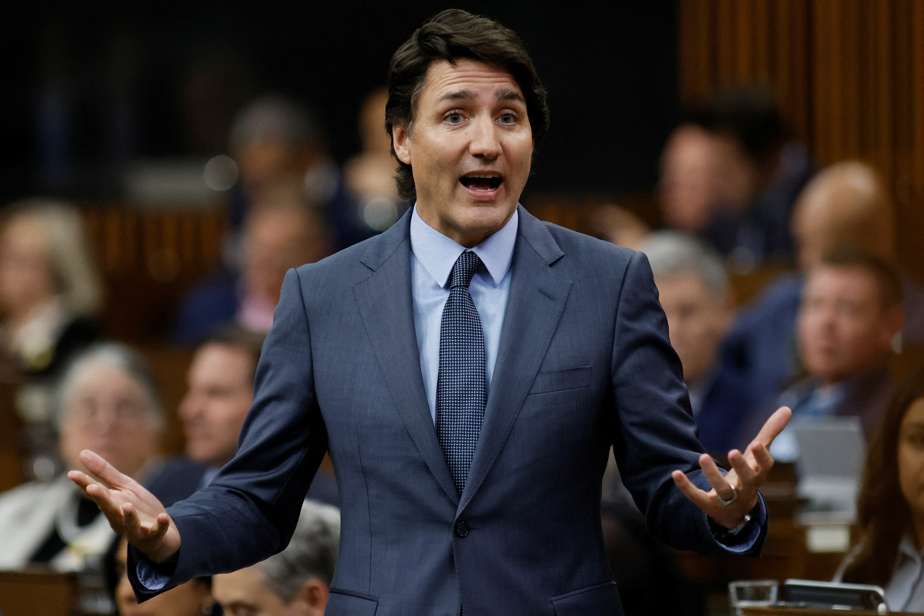(Washington) Prime Minister Justin Trudeau privately told the North Atlantic Treaty Organization (NATO) that Canada would never meet the military alliance’s defense spending targets, in a document which was leaked, reports the Washington Post.
One document in particular, unsigned and undated, includes this stark assessment among other “widespread” military deficiencies in Canada that are causing friction with security partners and allies, according to the newspaper.
The article, posted online Wednesday, describes it as a Pentagon assessment and does not include direct quotes from Mr. Trudeau himself or many excerpts from the document beyond a few words.
“Widespread defense deficiencies hamper Canadian capabilities,” writes the Washington Post, “while straining partner relationships and alliance contributions.”
All of this shows that the United States views Canada’s armed forces as underfunded and ill-equipped, making it difficult to maintain ties among allies and damaging Canada’s reputation on the international stage.
Defense Minister Anita Anand dismissed any suggestion that allies would raise concerns about Canada’s contributions as she prepared to meet around 50 counterparts this week at the contact group meeting. on the Defense of Ukraine, which is being held in Germany.
She said the issue of spending came up on Wednesday when she met with David Cohen, the U.S. ambassador to Canada.
Ms. Anand pointed out that the Liberal government has committed nearly $40 billion to modernizing NORAD and defending North America, as well as $8 billion in military spending announced in Budget 2022.
With regard to Latvia, Canada has launched an urgent and competitive procurement process to equip the country’s troops with anti-tank, anti-drone and anti-aircraft defense systems, the minister said.
Planning with the ten other nations participating in the Canadian-led battle group is still ongoing.
Criticism of defense spending has been a political mainstay in Ottawa, as everywhere else in the world. NATO requires its members to spend at least 2% of their GDP on defence, a goal that Canada fails to meet.
“Canada has always been too dependent on other nations to provide collective security. And we certainly benefited from that,” Conservative Party defense critic James Bezan said Wednesday.
“It’s time for us to step up and do our part, especially in this dangerous time we are going through,” he added.
Asked about the Washington Post article on Wednesday, Mr. Trudeau did not directly acknowledge the report or explain specifically what he told the alliance representatives.
The newspaper article indicates that the Armed Forces warned as early as February that a major military operation would be impossible, given its continued support for Ukraine and its support role leading a battle group of the NATO in Latvia, neighboring Russia.
The article doesn’t dwell on what that operation might be, but the United States wanted someone to lead a multinational support mission in gang-ravaged Haiti, and officials even cited Canada as a valid option.
No such commitment materialized last month, after President Joe Biden visited Ottawa. This meeting with Mr. Trudeau did, however, address other military shortcomings identified in the document, including the promised $14 billion investment in the continental defense system known as NORAD.
Canada has been criticized domestically and internationally for its reluctance to meet NATO spending expectations.
“It’s embarrassing,” Mr. Bezan said. He is telling the Americans behind the scenes that there is no way we will. This harms our bilateral relations, and not just in terms of security. »
Canada is one of the allies who committed in 2014 to achieving this goal.
The United States has shouldered a disproportionate share of the burden; the total spending of all other allies is only about half of US defense spending – “a constant, with variation, throughout the history of the alliance.”
However, Minister Anand believes that Canadians care about results and that the goal is “just one way to measure our contributions.”
“There are not many other countries that can say they have trained 36,000 Ukrainian soldiers,” she added, while responding to natural disasters in their country and increasing their presence in the region. indo-pacific.
Since the start of the war in Ukraine, Canada has provided over $1.3 billion in military aid.











